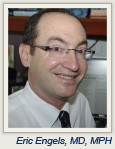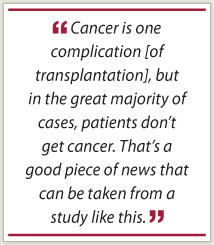In the News focuses on media reports that your patients may have questions about at their next visit. This continuing column will provide summaries of articles in the popular press that may prompt such questions, as well as comments from colleagues in the field.
 The Transplant Cancer Match Study, a large investigation linking transplant and cancer registries, confirms and expands on previous studies showing an increased cancer risk among recipients of solid organ transplantation. But these results need to be considered in the context of transplantation’s proven value in saving lives, according to Eric Engels, MD, MPH, lead author of the Transplant Cancer Match Study report and Senior Investigator, Division of Cancer Epidemiology and Genetics at NCI.
The Transplant Cancer Match Study, a large investigation linking transplant and cancer registries, confirms and expands on previous studies showing an increased cancer risk among recipients of solid organ transplantation. But these results need to be considered in the context of transplantation’s proven value in saving lives, according to Eric Engels, MD, MPH, lead author of the Transplant Cancer Match Study report and Senior Investigator, Division of Cancer Epidemiology and Genetics at NCI.
“Transplant is one of the great success stories of medicine. It helps patients with severe medical illnesses live, in many cases, a normal and largely healthy life. Cancer is one complication that we focus on, and we hope to reduce the risk of cancer, but in the great majority of cases, patients don’t get cancer. That’s a good piece of news that can be taken from a study like this as well,” Dr. Engels said in an interview with The ASCO Post.
Overall Cancer Risk Increased Twofold
The Transplant Cancer Match Study used linked data from the national Scientific Registry of Transplant Recipients and 13 population-based cancer registries in the United States from 1987 to 2008 to evaluate cancer risk in a cohort of 175,732 transplant recipients. “We observed a 2-fold overall increased risk of cancer, corresponding to an excess absolute risk … attributable to transplantation of approximately 0.7% per year,” the researchers reported in the Journal of the American Medical Association.1
 “Risk was increased for 32 different malignancies, some related to known infections (eg, anal cancer, Kaposi sarcoma) and others unrelated (eg, melanoma, thyroid, and lip cancers),” the investigators stated. The most common malignancies with elevated risk were non-Hodgkin lymphoma and cancers of the kidney, liver, and lung, corresponding to three commonly transplanted organs. Together, these four malignancies “comprised 43% of all cancer cases in transplant recipients compared with 21% in the U.S. general population,” the authors stated.
“Risk was increased for 32 different malignancies, some related to known infections (eg, anal cancer, Kaposi sarcoma) and others unrelated (eg, melanoma, thyroid, and lip cancers),” the investigators stated. The most common malignancies with elevated risk were non-Hodgkin lymphoma and cancers of the kidney, liver, and lung, corresponding to three commonly transplanted organs. Together, these four malignancies “comprised 43% of all cancer cases in transplant recipients compared with 21% in the U.S. general population,” the authors stated.
“Elevated risk of liver cancer was observed only among liver transplant recipients. The extraordinary risk in the first 6 months after liver transplant is probably an artifact of delayed recognition or reporting of liver cancer,” the authors wrote, adding that they “suspect that the vast majority of early cancers were prevalent cases from the explanted liver.”
As Dr. Engels explained, “We wrote that text very carefully to try to convey what we thought was going on. We do think that a lot of those early cancers are an artifact of the way our study was conducted. We identified cancers by linking databases together, and if the dates are off slightly in those databases, then it could look like the cancer occurred after the transplant. But what we think happened was that the cancer was present before the transplant. And when the liver was taken out to do the transplant, it was discovered then that cancer was in the liver, or it was reported at that time. So that would show up as a cancer diagnosis just after transplant, but really the cancer was present before the transplant.”
The cancer was not in the newly transplanted liver. “I know that the centers where the organs are procured do a careful review of the donor’s medical history and examine the organs for any evidence of disease,” Dr. Engels said.
The study also found that the risk was decreased for breast cancer and to a lesser extent prostate cancer. “We scratched our heads about that,” Dr. Engels said. “We don’t really know why the risk is decreased. We speculated that it could be due to screening practices—transplant candidates are screened in advance for those cancers, and anybody who has those cancers would not get a transplant. Maybe that helps reduce the risk after transplant. We don’t have another explanation for that.”
Medications Could Cause or Protect against Cancer
“Medications that are used in transplant recipients could have cancer-causing effects,” Dr. Engels said, stressing that evidence is not yet available to support this hypothesis. “We are not the first people to speculate about that possibility,” he noted. “The medicines are designed to suppress the immune system, but they may have other effects. It is difficult to sort that out, but it is something that I think people are thinking about. Even though we think that some of these drugs potentially have cancer-causing effects, that hasn’t been shown. Most patients don’t get cancer and get benefit from these drugs for their transplant.”
Some immunosuppressive drugs are being used in the treatment of cancer, such as everolimus (Afinitor) to overcome resistance to hormonal therapy in advanced breast cancer (as reported in The ASCO Post in November).2 “These drugs are used in some cases outside of transplant,” Dr. Engels explained. “They are used for people with autoimmune diseases, for example, and may actually have protective anticancer effects. But in all these cases, one has to weigh the benefits of the drug in helping people with severe medical illness against the possible risks. Somebody with metastatic cancer who is being considered for a trial of an immunosuppressive drug needs to recognize that there could be risks, but that the benefits are hopefully going to greatly outweigh the risks,” he said.
Dr. Engels and his coauthors stated, “future analyses will focus on specific cancers that occur excessively and examine associations with medical conditions and individual immunosuppressive medications.” The investigators are looking at specific cancers, including non-Hodgkin lymphoma, but do not yet have any results to share, Dr. Engels said. Another study is looking at the risks associated with intensive induction immunotherapy given at the time of transplant. ■
Disclosure: Dr. Engels reported no potential conflicts of interest.
SIDEBAR: Expect Questions from Your Patients
References
1. Engels EA, Pfeiffer RM, Fraumeni JF Jr, et al: Spectrum of cancer risk among US solid organ transplant recipients. JAMA 306:1891-1901, 2011.
2. Goodman A: Everolimus overcomes resistance to hormonal therapy in advanced breast cancer. The ASCO Post 2(16):1, November 1, 2011.

